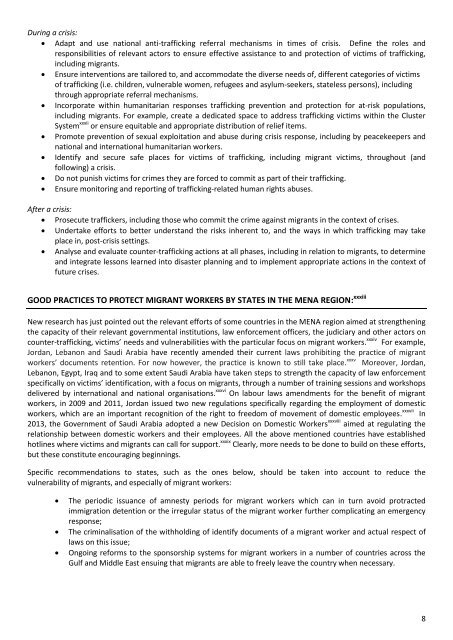Issue Brief
Trafficking%20Issue%20Brief%20final
Trafficking%20Issue%20Brief%20final
You also want an ePaper? Increase the reach of your titles
YUMPU automatically turns print PDFs into web optimized ePapers that Google loves.
During a crisis:<br />
Adapt and use national anti-trafficking referral mechanisms in times of crisis. Define the roles and<br />
responsibilities of relevant actors to ensure effective assistance to and protection of victims of trafficking,<br />
including migrants.<br />
Ensure interventions are tailored to, and accommodate the diverse needs of, different categories of victims<br />
of trafficking (i.e. children, vulnerable women, refugees and asylum-seekers, stateless persons), including<br />
through appropriate referral mechanisms.<br />
Incorporate within humanitarian responses trafficking prevention and protection for at-risk populations,<br />
including migrants. For example, create a dedicated space to address trafficking victims within the Cluster<br />
System xxxii or ensure equitable and appropriate distribution of relief items.<br />
Promote prevention of sexual exploitation and abuse during crisis response, including by peacekeepers and<br />
national and international humanitarian workers.<br />
Identify and secure safe places for victims of trafficking, including migrant victims, throughout (and<br />
following) a crisis.<br />
Do not punish victims for crimes they are forced to commit as part of their trafficking.<br />
Ensure monitoring and reporting of trafficking-related human rights abuses.<br />
After a crisis:<br />
Prosecute traffickers, including those who commit the crime against migrants in the context of crises.<br />
Undertake efforts to better understand the risks inherent to, and the ways in which trafficking may take<br />
place in, post-crisis settings.<br />
Analyse and evaluate counter-trafficking actions at all phases, including in relation to migrants, to determine<br />
and integrate lessons learned into disaster planning and to implement appropriate actions in the context of<br />
future crises.<br />
GOOD PRACTICES TO PROTECT MIGRANT WORKERS BY STATES IN THE MENA REGION: xxxiii<br />
New research has just pointed out the relevant efforts of some countries in the MENA region aimed at strengthening<br />
the capacity of their relevant governmental institutions, law enforcement officers, the judiciary and other actors on<br />
counter-trafficking, victims’ needs and vulnerabilities with the particular focus on migrant workers. xxxiv For example,<br />
Jordan, Lebanon and Saudi Arabia have recently amended their current laws prohibiting the practice of migrant<br />
workers’ documents retention. For now however, the practice is known to still take place. xxxv Moreover, Jordan,<br />
Lebanon, Egypt, Iraq and to some extent Saudi Arabia have taken steps to strength the capacity of law enforcement<br />
specifically on victims’ identification, with a focus on migrants, through a number of training sessions and workshops<br />
delivered by international and national organisations. xxxvi On labour laws amendments for the benefit of migrant<br />
workers, in 2009 and 2011, Jordan issued two new regulations specifically regarding the employment of domestic<br />
workers, which are an important recognition of the right to freedom of movement of domestic employees. xxxvii In<br />
2013, the Government of Saudi Arabia adopted a new Decision on Domestic Workers xxxviii aimed at regulating the<br />
relationship between domestic workers and their employees. All the above mentioned countries have established<br />
hotlines where victims and migrants can call for support. xxxix Clearly, more needs to be done to build on these efforts,<br />
but these constitute encouraging beginnings.<br />
Specific recommendations to states, such as the ones below, should be taken into account to reduce the<br />
vulnerability of migrants, and especially of migrant workers:<br />
<br />
<br />
<br />
The periodic issuance of amnesty periods for migrant workers which can in turn avoid protracted<br />
immigration detention or the irregular status of the migrant worker further complicating an emergency<br />
response;<br />
The criminalisation of the withholding of identify documents of a migrant worker and actual respect of<br />
laws on this issue;<br />
Ongoing reforms to the sponsorship systems for migrant workers in a number of countries across the<br />
Gulf and Middle East ensuing that migrants are able to freely leave the country when necessary.<br />
8


